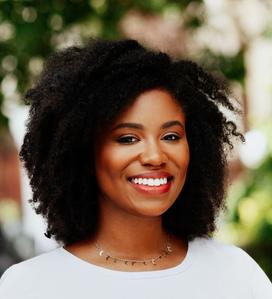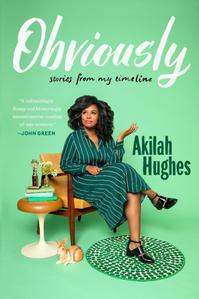
|
|
| photo: Natasha Janardan | |
Akilah Hughes is a writer, comedian and YouTuber, residing in Los Angeles, Calif. She's been a digital correspondent for MTV, HBO, Fusion, Comedy Central and more. Her comedic YouTube channel, It's Akilah, Obviously!, has more than 150,000 subscribers and her collection of personal essays, Obviously: Stories from My Timeline, is now available from Razorbill ($17.99).
You're a comedian, writer, correspondent for Pod Save America, YouTuber and more. Would you tell our readers a little bit about your journey to this point?
I'm originally from Kentucky and, during my first week of undergrad, which was probably halfway through my Internet-life, Facebook let our campus on the platform. I had spent years prior on Neopets, Livejournal, Myspace, etc., and only a few months after joining Facebook, I joined YouTube. Long story short: after always being a fan of Oprah and going to college with the express goal of copying her major and minor (Broadcasting and Theater), I saw the Lonely Island's "Lazy Sunday" video on YouTube. It was the first majorly viral, not-animated video that seemed made especially for the Internet. Once that happened, I knew that getting my hands on a camera and teaching myself to edit was going to be my way to be Oprah. I am from a very small suburb, and having exactly zero connections in Hollywood, this was my strategy for making a portfolio.
So I made videos. I made A TON of videos. And then I graduated college and made more videos. Then I moved to Orlando and made fewer videos--but still made videos. I moved back home to Kentucky/Cincinnati and made more videos, and then I moved to New York City and continued to make videos while also taking classes at Upright Citizens Brigade in improv and sketch. Within a year and a half of living in New York, I had a video go viral: Meet Your First Black Girlfriend, a guide for dating black women and not embarrassing them or yourself. That video led to a writing and acting offer from MTV for their original web series division and after that I started freelancing for every outlet you can think of--2013-2016 was a golden era for independent creators. In 2017, Crooked Media reached out to me about contributing and I was super hyped because I love Pod Save and Lovett or Leave It. After flying around the country to do their shows for a year, they finally popped the question: "Will you be on HBO with us?" And I was like, "I THOUGHT YOU'D NEVER ASK." The journey to that was long and winding, and still it feels like it's only the beginning.
Have you always wanted to write? What made you want to write this book in particular?
I always loved reading, but high school essays really killed my love of writing. I was just writing for a grade and never about a topic that interested me. When the Internet and blogging got really good, I had a little bit of an itch to do it.
The book came about in a pretty untraditional way. I had lunch with my friend and now-editor and her boss, and it was just a casual lunch. About a week later, I had coffee with another Penguin team member and they were like, "So what's your book?" and I was like, "Um, huh?" So, I started writing up a few ideas for the way the book could be, and they told me to give it a shot.
 Why did you want to write for a young adult audience?
Why did you want to write for a young adult audience?
Most of the stories in this book are about growing up in a place where I didn't feel my experience reflected, and having to forge my own path. I think younger people understand and appreciate stories like that more: the idea of trying to make things you love that don't currently exist. I also don't think of this book as a memoir (though John Green's absolutely lovely blurb disagrees) as much as I consider it lessons learned and advice for surviving. Gen Z also understands YouTube and that world more. I was never interested in convincing adults that YouTube is legitimate as a career or as a form of entertainment, and if Donald Glover, Justin Bieber and Lilly Singh had a hard time breaking into the mainstream, why did I think I could do something different? I think it would have been a much more defensive and explain-y book if it hadn't been YA.
Were there any particularly positive takeaways from your experience writing the book? Anything that sticks out to you as being fun or interesting or joyful?
When I finally got over telling people that I was writing a book (I was definitely worried for a long time that people would think, "why does SHE get to write a book?" and "how can a 20-something tell anybody anything?"), I found that it was easier to be honest in my writing and feel less self-conscious or less consumed with how other people might perceive it. I found a very peculiar kind of peace--I want people to love the book, but I won't be destroyed if they don't because I'm proud that I finished it. This must be how marathon runners feel. They're not competing for first place (well, most aren't), they're competing with their own will to finish.
What do you hope readers take away from the book?
I want people who feel different from the people in their town, in their school, in their family, to feel like there's a path for them to be happy. Growing up in a small place with little diversity, every day was a fight to feel good enough, like I wasn't so weird or that my aspirations weren't too far from the mainstream. I wanted to fit in so bad. And now everyone I worried about judging my online life and my outspokenness has gushed over my Internet career. They can't believe I "get to be friends" with some of the wonderful people who also do what I do. You just have to try hard and trust yourself. --Siân Gaetano, children's and YA editor, Shelf Awareness

